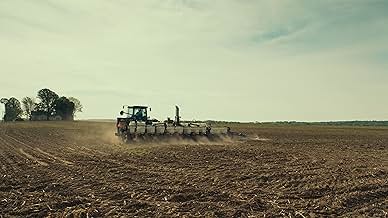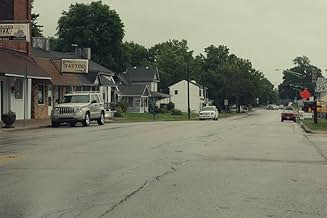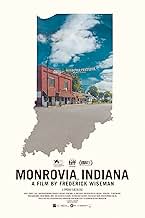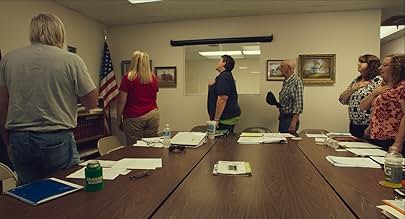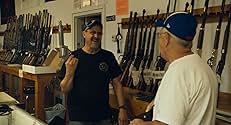Following the 2016 presidential election, Frederick Wiseman's documentary dissects small-town America to understand how its values impact and influence the political landscape of the nation.Following the 2016 presidential election, Frederick Wiseman's documentary dissects small-town America to understand how its values impact and influence the political landscape of the nation.Following the 2016 presidential election, Frederick Wiseman's documentary dissects small-town America to understand how its values impact and influence the political landscape of the nation.
- Director
- Awards
- 1 win & 4 nominations total
Featured reviews
For the record, I arrived 5-10 minutes late.
This documentary provides a well seamed collection of examples of everyday life in a place I've never heard about. History of their sports teams, debates over investing in new residential housing vs new businesses (the newest neighborhood is where the majority of their volunteer firefighters and people who returned to Monrovia reside), freemasons ceremony, WTH is up with the newest neighborhood's fire hydrants, barbershop, hair salon, fitness class, a funeral, etc. Monrovia, Indiana does well at what it intends. This would be an interesting documentary to discuss academically.
Side Note: I did lose my interest at times, but that's a matter of personal taste. Some topics just didn't interest me. The director did a pretty decent job with editing. I give that a B.
This documentary provides a well seamed collection of examples of everyday life in a place I've never heard about. History of their sports teams, debates over investing in new residential housing vs new businesses (the newest neighborhood is where the majority of their volunteer firefighters and people who returned to Monrovia reside), freemasons ceremony, WTH is up with the newest neighborhood's fire hydrants, barbershop, hair salon, fitness class, a funeral, etc. Monrovia, Indiana does well at what it intends. This would be an interesting documentary to discuss academically.
Side Note: I did lose my interest at times, but that's a matter of personal taste. Some topics just didn't interest me. The director did a pretty decent job with editing. I give that a B.
The film Monrovia Indiana is a truly remarkable achievement in that just when you think it cannot possible go on any longer, it just keeps going, much like the Great Crossroads itself. This is a shame.
Contrast with Hale County. That film too turned the camera on an overlooked slice of America, and yet it transcended the typical narrative to reveal something more, something unexpected. A conversation with a man burning leaves turned into the sublime. It provided space for you to think and reflect. Mr. Weisman on the other hand seems to believe that shots of coke in the supermarket are quite subversive, and that it is dreadfully important that viewers experience a full length Masonic ceremony, stumbling and stammering and all. Even Gopher Prairie is a more flattering portrait of small town America than this.
Oh and here's a shot of a field. Wow that sure is a field! And oh here's a shot of a building. That's sure some building there! It all literally looks like google street view.
And oh and now they've been talking about a bench for five minutes. And now a dog is getting its tail amputated for who knows why. And now we are at the mattress store. And now we're in church. Just kill me now.
I refuse to believe that America can possibly be as dull, as small, and as ugly as it is presented as here. There is no profound insight in debating a bench! There is nothing to reveal in a mattress warranty! This is not art but a caricature that has the gall to try passing itself off as an auteur's quietly documentary of real America.
In short: this is a film we've all seen before and do not ever need to see again. It's amazingly boring both visually and narratively, and conceptually bankrupt. The best that can be said of this self indulgent mess is that it quickly and unknowingly descends into self parody.
Contrast with Hale County. That film too turned the camera on an overlooked slice of America, and yet it transcended the typical narrative to reveal something more, something unexpected. A conversation with a man burning leaves turned into the sublime. It provided space for you to think and reflect. Mr. Weisman on the other hand seems to believe that shots of coke in the supermarket are quite subversive, and that it is dreadfully important that viewers experience a full length Masonic ceremony, stumbling and stammering and all. Even Gopher Prairie is a more flattering portrait of small town America than this.
Oh and here's a shot of a field. Wow that sure is a field! And oh here's a shot of a building. That's sure some building there! It all literally looks like google street view.
And oh and now they've been talking about a bench for five minutes. And now a dog is getting its tail amputated for who knows why. And now we are at the mattress store. And now we're in church. Just kill me now.
I refuse to believe that America can possibly be as dull, as small, and as ugly as it is presented as here. There is no profound insight in debating a bench! There is nothing to reveal in a mattress warranty! This is not art but a caricature that has the gall to try passing itself off as an auteur's quietly documentary of real America.
In short: this is a film we've all seen before and do not ever need to see again. It's amazingly boring both visually and narratively, and conceptually bankrupt. The best that can be said of this self indulgent mess is that it quickly and unknowingly descends into self parody.
This is not one of Wiseman's best films. Many people complain about how long it is and that it feels like it's going nowhere. Well, the 2nd part is correct. The film is somewhat long (143 minutes), but most of Wiseman's films run between 3-4 hours, and a few of them go longer than that. City Hall is 4 1/2 hours, and Near Death is 6 hours. This is a relatively short one. The issue is that the film feels too short, and Wiseman, uncharacteristically, cuts around too much and doesn't let his camera run on the people on the town. Part of Wiseman's genius is that he captures fascinating parts of reality in his movies, but they are often extended and some scenes run up to 20 minutes in length. Despite these extended scenes, his films are never boring and I love almost everything I've seen by him. However, in Monrovia, Indiana, he doesn't do that. He just jumps around randomly to people and events without any flow to it. It's almost like he wasn't that interested in these people, and most of the people in the film appear merely once in the picture. In his other pictures, the subjects often appear throughout the film and the films flow better. The one time Wiseman lets a scene play out is at the end when a local woman passes away. That scene runs 20 minutes or so and is the best scene in the film.
We never really get to know the town too much because of the overly episodic nature of the film and that Wiseman never bothers to get to know the people that well. One of the few disappointments from Wiseman.
We never really get to know the town too much because of the overly episodic nature of the film and that Wiseman never bothers to get to know the people that well. One of the few disappointments from Wiseman.
Very weird seeing a documentary about a small town 15 minutes from where I live, and that I've spent a decent chunk of time in. Seeing it from an outsider's perspective was different, and seeing all of these roads I've driven on through a camera lens was an odd experience. Honestly surprised the director found enough content in Monrovia to make an almost two and a half hour movie out of, considering I can drive across town in twenty seconds. Still cool, though, never knew this documentary existed. I always like documentaries that show an unfiltered glimpse into the life of others, and this was no different, even though the life it showed was basically the same as the one I live.
Here's an inside look at the workings of a town in the U. S. heartland. We see the people of Monrovia at their feedlots, corn fields, municipal hearings, schools and places of worship - a great panorama of life in this good place. Some Midwestern stereotypes are knocked down here, not on purpose but as revealed by the responsible way these people act. As a viewer I thank the people of Monrovia - and it's an impressive cross-section of people - for granting access to so much of what matters in this community. There is a bit of self-deprecation, people of Monrovia acknowledging they live in a small town. But in fact it's a big place, in civic spirit and caring for others.
Did you know
- TriviaShot in ten weeks.
Details
Box office
- Gross US & Canada
- $63,944
- Opening weekend US & Canada
- $5,172
- Oct 28, 2018
- Gross worldwide
- $64,596
- Runtime
- 2h 23m(143 min)
- Color
- Aspect ratio
- 1.85 : 1
Contribute to this page
Suggest an edit or add missing content



